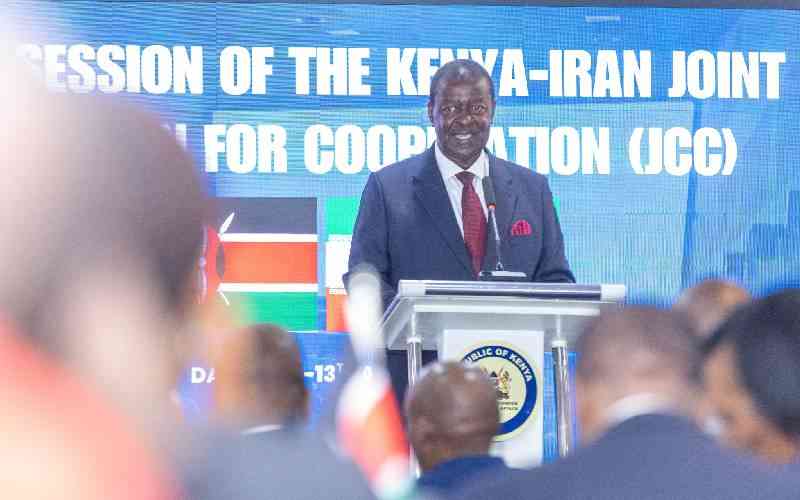Kenya and Iran have agreed to form a joint committee to remove trade barriers between the two countries in the next 60 days.
The move paves the way for lifting a ban on Kenyan tea exports to the Middle Eastern nation, which was triggered by an alleged criminal trade malpractice involving a Kenyan firm.
This agreement was reached during the 7th Session of the Kenya–Iran Joint Commission for Cooperation (JCC) in Nairobi on Tuesday, co-chaired by Prime Cabinet Secretary Musalia Mudavadi and Iran’s Minister of Agriculture Dr Gholamreza Nouri Ghezalcheh.
It comes in the wake of a criminal trade malpractice involving a Kenyan company, which has since been deregistered by the Tea Board of Kenya and is set to face prosecution.
Follow The Standard
channel
on WhatsApp
Investigations revealed that the firm imported low-grade tea, blended it, and re-exported it to Iran as high-grade Kenyan tea, triggering a diplomatic row between the two countries and the subsequent ban. “Before the unfortunate incident, which resulted in the suspension of tea exports to Iran, the country was one of the top importers of Kenyan tea. Tea exports grew from 3.2 metric tonnes in 2020 to a record high of 13 metric tonnes in 2024, with corresponding values of $5 million (Sh645 million) in 2020 and $33 million (Sh4.25 billion) in 2024,” said Mudavadi.
Mudavdi said the growth was achieved despite a price cap of $2 (Sh258 million) per kilo for Kenyan tea, which is of premium grade compared with Indian and Sri Lankan tea.
Follow The Standard
channel
on WhatsApp
Kenya and Iran have agreed to form a joint committee to remove trade barriers between the two countries in the next 60 days.
The move paves the way for lifting a ban on Kenyan tea exports to the Middle Eastern nation, which was triggered by an alleged criminal trade malpractice involving a Kenyan firm.
This agreement was reached during the 7th Session of the Kenya–Iran Joint Commission for Cooperation (JCC) in Nairobi on Tuesday, co-chaired by Prime Cabinet Secretary Musalia Mudavadi and Iran’s Minister of Agriculture Dr Gholamreza Nouri Ghezalcheh.
It comes in the wake of a criminal trade malpractice involving a Kenyan company, which has since been deregistered by the Tea Board of Kenya and is set to face prosecution.
Follow The Standard
channel
on WhatsApp
Investigations revealed that the firm imported low-grade tea, blended it, and re-exported it to Iran as high-grade Kenyan tea, triggering a diplomatic row between the two countries and the subsequent ban. “Before the unfortunate incident, which resulted in the suspension of tea exports to Iran, the country was one of the top importers of Kenyan tea. Tea exports grew from 3.2 metric tonnes in 2020 to a record high of 13 metric tonnes in 2024, with corresponding values of $5 million (Sh645 million) in 2020 and $33 million (Sh4.25 billion) in 2024,” said Mudavadi.
Mudavdi said the growth was achieved despite a price cap of $2 (Sh258 million) per kilo for Kenyan tea, which is of premium grade compared with Indian and Sri Lankan tea.
Follow The Standard
channel
on WhatsApp
By Irene Githinji
